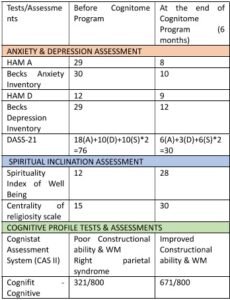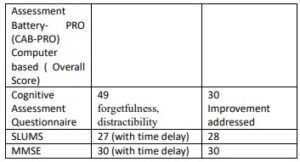Treatment of Multidecadal Severe Generalized Anxiety Disorder (GAD) using Cognitome Program approach
Dr. Mohita Shrivastava
Unified Nursing Research, Midwifery & Women’s Health Journal
Authors: Dr. Mohita Shrivastava
Affiliation: Founder & CEO,“Cognitome Program”
Category: Article (Case study)
keywards: GAD, Brain wave entrainment, Cognitive functions, Cognifit (Pro) & EEG brain waves (MUSE)
Unified Citation Journals, 3(1) 13-14; https://doi.org/10.52402/Nursing2021
ISSN 2754-0944
Introduction:
Generalized anxiety disorder (GAD) is characterized by psychosocial impairment due to excessive anxious thoughts of fear and worry & has high comorbidity with other psychological disorders including major depressive disorders (American Psychiatric Association, 2013) [1] . Chronic GAD also leads to decline in cognitive abilities and cognitive functions impairment [2] [3]. Evidence suggests that emerging interventions viz; auditory brain wave entrainment [1] [4] [6] , cognitive exercises (both manual/computer based-to improve cognitive flexibility, inhibitory control, attention, memory, goal directed behavior) [2] [3] , mindfulness therapy[5], journaling & affirmation, helps to induce neuroplastic changes & cognitive restructuring thereby improving management of GAD and Depression and aid in better coping skills and psychological flexibility[1] [6] .
Background: :
A case study of chronic Generalized Anxiety Disorder (GAD) (with progressive symptoms of depression) of an Asian male (aged 39 years) (Client Code: MI-51 AG- identity kept confidential) on a continuous dose of 225mg VENLOR/EFLEXOR a SNRI drug from past 22 years using the Cognitome program which employes cognitive skills training (manual/computer based), brain wave entrainment using equisync binaural waves, solfeggio frequencies, acoustic meditation, muse neurofeedback using muse monitor, counselling, mind pruning exercises, visiting natural habitat and mindful diet. The initial condition of the client indicated Generalized Anxiety along with panic attacks and mild to moderate depression with bouts of crying, periodic aches in the legs & difficulty in sleeping without the SNRI drug. The client had complained of moderate to high cognitive deficit especially in the tasks related to selective attention, inhibitory control, processing speed, working memory & short-term memory.
Method:
A comprehensive assessment protocol under the Category- CARE (Consultation, Assessment, Results & Evaluation) plan of the Cognitome program was employed for the evaluation of GAD & related depression, cognitive functions, lateralization of functions, spiritual inclination, using reliable & validated neuropsychological/psychological tests used globally. TABLE 1. The Client consent and confidentiality forms were considered an integral part of the ethics code of the Cognitome Program. Following this the CURE plan (Customized, Unique, Relevant, Enriching) was administered in 3 stages of 51 days each and updated periodically as per the progress of the client.
Results:
Following the Cognitome program for 6 months- an improvement in the cognitive profile/skills, reduction in the symptoms of anxiety, depression, better physical/ psychological well-being was exhibited as indicated by the score of the tests results. TABLE 1.


Research interest: Anxiety, PTSD, Cognitive Control & Cognitivefunctions, neuroscientific meditation,
hemispheric lateralization
Conclusion:
GAD can be chronic, impairing, & debilitating not only for psychological well-being but also for cognitive abilities/functions. Cognitome Program, a structured, neuroscientific protocol used for this case study, has shown significant improvement in the cognitive skill/functions, symptoms of anxiety, & helped the client to attain a medicine free state
Biography:
Dr. Mohita Shrivastava, Founder & CEO, “Cognitome Program” @Cognitome LLC, is a Neuroscientist & a Neuropsychologist & holds a Ph.D. degree in the field of Neurosciences, AIIMS, New Delhi, India & completed a part of Ph.D research training from Kansas University Medical Centre, USA. She holds two master’s degrees: Biomedical Sciences, University of Delhi and Applied Clinical Psychology, Annamalai University along with an Advanced PG Diploma in Applied Neuropsychology, University of Bristol, UK. She has published various peer reviewed research & review articles in internationally acclaimed journals, & also contributed as a columnist in the field of mental health in leading daily’s & magazines of GCC region.
References:
[1] Garner A & Stuart GL., (2023) Clin Case Stud.; 22(2): 120–137. [2] H.Y.W et al., (2022) Front Psychiatry; 13: 960953 [3] K.M.L et al., (2019) Front Psychol;10:4. [4] F.F., et al (2020) Br J Pain 2020; 14: 161–70. [5] S.G.H et al., (2010 Apr) J Consult Clin Psychol.; 78(2): 169–183. [6] G.S.L et al., (2021) Front Psychol; 12:742892.
Upcoming Conferences;
- 14th International Nursing, Healthcare and Patient Safety Conference from July 25-27, 2024 in Holiday Inn Dubai, UAE.
More Details: https://nursing-healthcare.universeconferences.com/ - 15th American Healthcare & Hospital Management Summit from May 14-16, 2025 in San Francisco, USA.
More Details: https://health.universeconferences.com/ - 15th World Nursing, Healthcare Management, and Patient Safety Conference May 14-17, 2025 in San Francisco, USA
More Details: https://nursing.universeconferences.com/

